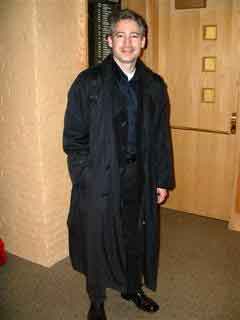.
Brian Greene

Brian Greene (*)
Brian Greene (born February 9, 1963) is a theoretical physicist and one of the best-known string theorists. Since 1996 he has been a professor at Columbia University. Brian Greene has worked on mirror symmetry, relating two different Calabi-Yau manifolds (concretely, relating the conifold to one of its orbifolds). He also understood the flop transition, a mild form of topology change, showing that topology in string theory can change at the conifold point.
Biography
Born in New York City, Greene was a prodigy in mathematics. His skill in mathematics was such that by the time he was twelve years old, he was being privately tutored in mathematics by a Columbia University professor because he had surpassed the high-school math level.[citation needed] His father, Alan Greene, was a one-time vaudeville performer and high school dropout who later worked as a voice coach and composer.[1] After his tenure at Stuyvesant High School,[2] Brian Greene entered Harvard in 1980 to major in physics, and with his bachelor's degree, Greene earned his PhD. at Oxford University in England in 1986 as a Rhodes Scholar.
Greene joined the staff of Columbia University in 1996; this remains his current position. At Columbia, Greene is co-director of the University's Institute for Strings, Cosmology, and Astroparticle Physics (ISCAP), and is leading a research program applying superstring theory to cosmological questions. Prior to this, Greene joined the physics faculty of Cornell University in 1990. He was appointed to a full professorship at Cornell University in 1995. Professor Greene often lectures outside of the collegiate setting, at both a general and a technical level, in more than twenty-five countries. One of his latest projects is to organize an annual Science Festival to be held in New York City, starting in 2008.[3]
He currently studies string cosmology, especially the imprints of trans-Planckian physics on the cosmic microwave background, and brane-gas cosmologies that could explain why the space around us has three large dimensions, expanding on the suggestion of a black hole electron, namely that the electron may be a black hole.
Books
His book The Elegant Universe: Superstrings, Hidden Dimensions, and the Quest for the Ultimate Theory (1999) is a popularization of superstring theory and M-theory. It was a finalist for the Pulitzer Prize in nonfiction, and winner of The Aventis Prizes for Science Books in 2000.[4] The Elegant Universe was later made into a PBS television special (The Elegant Universe) with Dr. Greene as the narrator. His second book,, The Fabric of the Cosmos: Space. Time. And the Texture of Reality (2004), is about space, time, and the nature of the universe. Aspects covered in this book include non-local particle entanglement as it relates to special relativity and basic explanations of string theory. It is an examination of the very nature of matter and reality, covering such topics as spacetime and cosmology, origins and unification, and including an exploration into reality and the imagination.
Media attention
Bryan Greene also dabbles in acting; he helped John Lithgow with scientific dialogue for the television series 3rd Rock from the Sun, and he had a cameo role in the film Frequency. Recently, he was a consultant in the time-travel movie Déjà Vu which used some theoretical physics terms. He also had a cameo appearance as an Intel Scientist in 2007's "The Last Mimzy". Greene was mentioned in the 2002 Angel episode "Supersymmetry" and in the 2008 Stargate Atlantis episode "Trio".
* Professor Greene's many media appearances include Charlie Rose, The Colbert Report, The NewsHour with Jim Lehrer, The Century with Peter Jennings, CNN, TIME, Nightline in Primetime, Late Night with Conan O'Brien, The Late Show with David Letterman, Nova, specially based on the theories of The Elegant Universe.
Publications
* R. Easther, B. R. Greene, M. G. Jackson and D. Kabat, "String windings in the early universe. JCAP {0502}, 009 (2005).
* R. Easther, B. Greene, W. Kinney, G. Shiu, "A Generic Estimate of Trans-Planckian Modifications to the Primordial Power Spectrum in Inflation". Phys. Rev. D66 (2002). 023518.
* R. Easther, B. Greene, W. Kinney, G. Shiu, "Inflation as a Probe of Short Distance Physics". Phys. Rev. D64 (2001) 103502.
* Brian R. Greene, "D-Brane Topology Changing Transitions". Nucl. Phys. B525 (1998) 284-296.
* Michael R. Douglas, Brian R. Greene, David R. Morrison, "Orbifold Resolution by D-Branes". Nucl.Phys. B506 (1997) 84-106.
* Brian R. Greene, David R. Morrison, Andrew Strominger, "Black Hole Condensation and the Unification of String Vacua". Nucl.Phys. B451 (1995) 109-120.
* P.S. Aspinwall, B.R. Greene, D.R. Morrison, "Calabi-Yau Moduli Space, Mirror Manifolds and Spacetime Topology Change in String Theory". Nucl.Phys. B416 (1994) 414-480.
* B.R.Greene and M.R.Plesser, "Duality in Calabi-Yau Moduli Space". Nucl. Phys. B338 (1990) 15.
* Brian R. Greene, "The Fabric of the Cosmos: Space, Time, and the Texture of Reality]", 2005.
* Brian R. Greene, "The Elegant Universe: Superstrings, Hidden Dimensions, and the Quest for the Ultimate Theory", 1999
See also
* List of physicists
* List of theoretical physicists
* String Theory
* Theory of everything
* Unified Field Theory
References
1. ^ Biography for Brian Greene. Internet Movie Database. Retrieved on 2007-10-31.
2. ^ JR Minkel (Spring 2006). "The String is The Thing - Brian Greene Unravels the Fabric of the Universe". Columbia Magazine. Columbia University. Retrieved on 2007-10-31.
3. ^ Shapiro, Gary. "New York, Cambridge To Host Citywide Science Festivals", New York Sun.
4. ^ Profile of Brian Greene. Royce Carlton Incorporated. Retrieved on 2008-2-17.
Links
* Brian Greene faculty homepage
* The Elegant Universe at Public Broadcasting System
* The Future of String Theory - A conversation with Brian Greene from Scientific American
* Edge.org – A talk with Brian Greene (requires Real Player).
* Find author Brian R. Greene in Stanford SPIRES HEP database.
* Radio Interview from This Week in Science August 10, 2005 Broadcast
* Brian Greene Charlie Rose interviews. 16 Feb. 1999 interview
Retrieved from "http://en.wikipedia.org/"
All text is available under the terms of the GNU Free Documentation License

